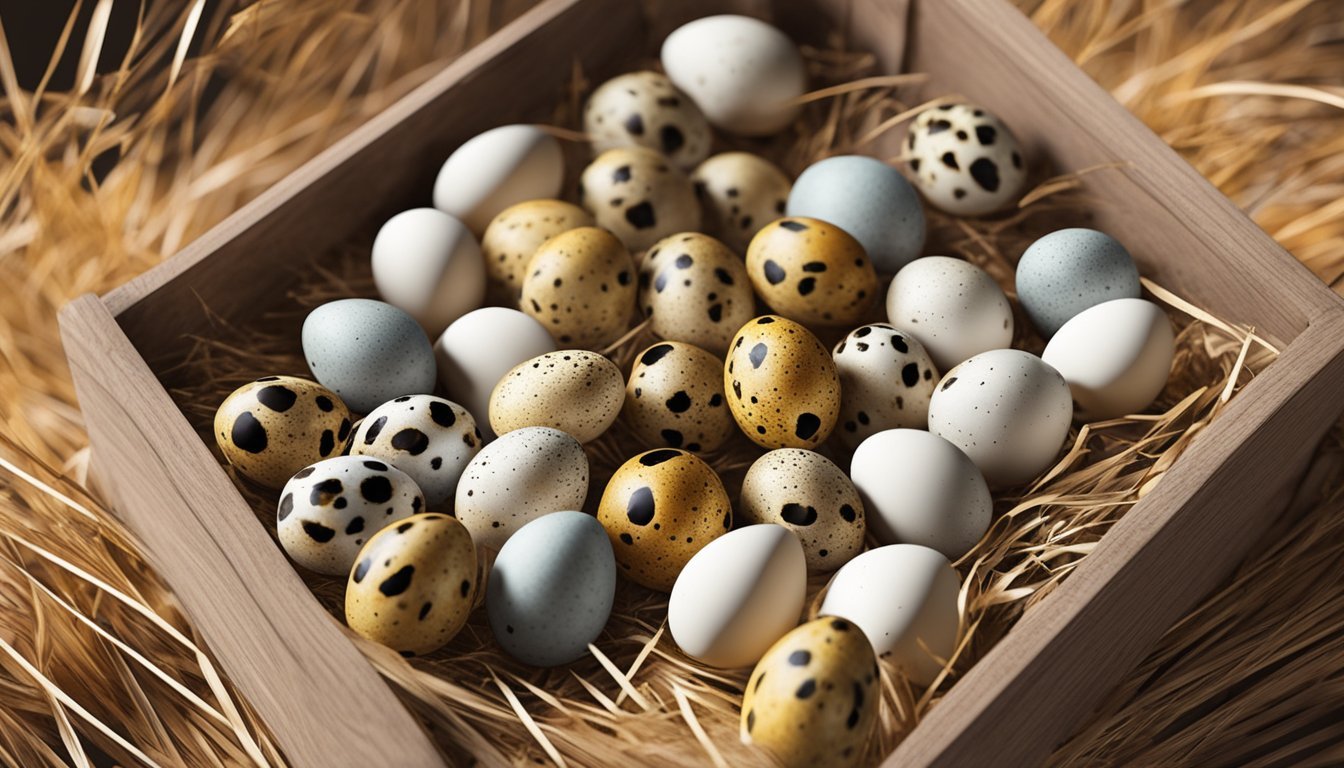Quail Eggs
Nutritional Benefits of This Tiny Powerhouse
Quail (What wine goes well with quail?) eggs, often considered a delicacy, are small and packed with a nutritional punch that rivals their larger poultry counterparts, such as chicken eggs. They are distinguished by their unique spotted shell and petite size, where three to four quail eggs are equivalent to one chicken egg. Despite their diminutive stature, these eggs harbor a significant amount of essential nutrients, including proteins, beneficial fatty acids, vitamins, and minerals, making them a mighty component of a balanced diet.
In the culinary world, quail eggs are not only cherished for their nutritional value but also for their versatility in various dishes. They can be boiled, pickled, or fried, and serve as an elegant addition to canapés and salads, offering a subtle, richer flavor that enhances the overall taste profile. With their high content of beneficial fatty acids, quail eggs have been suggested to support heart health.
Each quail egg contains roughly 14 calories and provides a good amount of protein and fat, with minimal carbohydrates, aligning with energy-efficient dietary choices. This nutrient-dense profile contributes to their reputation as a beneficial food item that can be incorporated into various meal plans. Moreover, the ease of cooking and the aesthetic appeal of quail eggs make them particularly popular for special occasions and gourmet dishes.
Quail Eggs Overview
Quail eggs are recognized for their unique size and nutritional value, offering a variety of essential vitamins and minerals that are beneficial to one's health. These small, but nutrient-dense eggs serve as a delectable alternative to the more commonly consumed chicken eggs.
Comparing Quail and Chicken Eggs
Quail eggs are significantly smaller than chicken eggs, yet they pack a substantial nutritional punch. On average, quail eggs provide slightly more calories and fat than chicken eggs, including a higher proportion of monounsaturated and polyunsaturated fats, which contribute to heart health. They also contain a higher ratio of yolk to white, which explains their creamier taste and texture.
Calories:
Quail Eggs: 14*
Chicken Eggs: 62**
Protein:
Quail Eggs: 1.2 g*
Chicken Eggs: 5.5 g**
Total Fat:
Quail Eggs: 1 g*
Chicken Eggs: 4.6 g**
Iron:
Quail Eggs: 2% DV*
Chicken Eggs: 3% DV**
Phosphorus:
Quail Eggs: 4% DV*
Chicken Eggs: 9% DV**
Selenium:
Quail Eggs: 6% DV*
Chicken Eggs: 22% DV**
*Based on a single egg (9g)
**Based on a large chicken egg (50g)
Quail eggs excel in their content of b12, iron, and riboflavin, while chicken eggs generally contain more vitamin A, vitamin D, and cholesterol. Both eggs are excellent sources of choline, a nutrient essential for brain health.
Nutritional Profile of Quail Eggs
The nutritional profile of quail eggs is impressive considering their size. They contribute significantly to the daily recommended value of several key nutrients and provide a good balance of healthy fats. Quail eggs are a good source of:
Protein: vital for muscle growth and repair
Vitamin B12: supports brain function and red blood cell formation
Selenium: an antioxidant that helps protect against cellular damage
Phosphorus: essential for healthy bones and teeth
Choline: contributes to brain health and metabolism
Iron: necessary for transporting oxygen in the bloodstream
Additionally, quail eggs contain zinc, a mineral important for immune function and metabolism. The presence of these nutrients makes quail eggs a valuable addition to a diverse and balanced diet.
Health Benefits of Quail Eggs
Quail eggs are nutritionally dense, offering a rich supply of protein, vitamins, and minerals that contribute to various health benefits including immunological support and muscle maintenance.
Boosting the Immune System
Quail eggs contain a notable amount of vitamins such as Vitamin B12 and selenium, both of which are critical in maintaining a healthy immune system. Vitamin B12 plays a vital role in the production of white blood cells, which are essential for proper immune system functioning. Selenium acts as an antioxidant, protecting the body from damage caused by free radicals and infections.
Supporting Muscle Growth and Repair
The high-quality protein in quail eggs, which includes all essential amino acids, is fundamental for muscle growth and repair. This makes them an excellent food choice for individuals looking to increase muscle mass or recover from muscle wear and tear. The iron present in quail eggs also contributes to this process, as it is an essential component of hemoglobin, which transports oxygen to the muscles, further facilitating their growth and repair.
Culinary Uses of Quail Eggs
Quail eggs are prized for their versatility in cooking and baking, offering a unique twist to many traditional dishes with their rich taste and delicate size.
Different Cooking Methods
Quail eggs can be boiled to perfection, requiring less water and shorter cooking times than chicken eggs due to their small size. Soft-boiled quail eggs take approximately two minutes, while hard-boiled eggs are often ready in under five minutes. These eggs can also be fried or scrambled, making them suitable for breakfast dishes. The eggs' petite dimensions make them ideal for baking in miniature pastries or as garnishes on canapés. Due to their delicate shells, care should be taken when poaching or preparing them as deviled eggs, ensuring they remain intact while delivering a burst of flavor.
Boiled: 2 minutes for soft, under 5 minutes for hard
Fried: Quick fry, often less than a minute per side
Baked: Great for mini quiches and pastries
Poached: Gentle cooking to maintain structure
Scrambled: Quick and flavorful breakfast option
Quail Eggs in World Cuisines
In global cuisines, quail eggs are a prized ingredient. They are a staple in Asian dishes such as sushi (What wine goes well with sushi?) and ramen, where their size and appearance contribute to the dish's aesthetic and taste. Noodle dishes often feature soft or hard-boiled quail eggs as a flavorful protein component. They are also used as a rich, savory addition to custard in some desserts, and when pickled, they serve as a tangy snack or appetizer. Across Europe, quail eggs garnish salads such as the classic Nicoise, add luxury to appetizers (What wine goes well with appetizers?) like canapés, and elevate breakfast dishes and baked goods with their subtle yet distinct flavor.
Asia: Sushi, ramen, various noodle dishes
Europe: Salads (Nicoise), appetizers, breakfast creations, baked delicacies
Desserts: Custard preparations
Pickled: Served as snacks or appetizers
Practical Tips for Quail Eggs
When working with quail eggs, understanding the proper cooking techniques and mastering the delicate process of cracking and peeling are crucial for maintaining their texture and flavor.
How to Cook Quail Eggs
To boil quail eggs, one should bring a medium saucepan of water to a rolling boil. Gently lower the eggs into the water with a spoon and let them cook for 2 to 4 minutes. For soft-boiled eggs, a cooking time of about 2 minutes is sufficient, while hard-boiled quail eggs may require up to 3 minutes and 30 seconds. Transferring the eggs to a bowl of cold water immediately after boiling can ease peeling and halt the cooking process, preserving the delicate yolk and whites' texture.
For poaching quail eggs, bring about 5 cm of water to a boil in a frying pan, then reduce to a simmer and add a pinch of salt and a splash of vinegar to help the whites set. Crack eggs into separate small bowls or ramekins before carefully sliding them into the water. Cook for just about 1 minute until whites are set but yolks remain runny.
When baking quail eggs, a muffin tin can be used to cook multiple eggs evenly. Preheat the oven, place an egg in each muffin cup, and bake until whites are set but yolks are still soft.
Tips for Cracking and Peeling
The shell of a quail egg is notably thicker and more fragile than a chicken egg, which can make them trickier to crack and peel. To crack a quail egg, one should use a sharp knife to gently tap around the circumference of the egg or use specialized quail egg scissors. Holding the egg over a bowl, gently separate the halves to let the egg slip out.
For peeling boiled quail eggs, it helps to start by rolling the egg gently on a hard surface to create cracks all over. Soaking the eggs in cold water for a few minutes can also make peeling easier. Pinch the wider end of the egg where there is usually an air pocket, and begin to peel away the shell, being careful with the tender whites underneath.
Economic and Dietary Considerations
Quail eggs are often perceived as a specialty food product, which has implications for their economic accessibility and inclusion in dietary routines. The following subsections provide a comprehensive look at how these small eggs compare to the more common chicken eggs in terms of cost and how they can be integrated into everyday diets.
Cost Comparison with Chicken Eggs
While quail eggs are smaller in size than chicken eggs, they are not always cheaper. In some markets, quail eggs can be found at a higher price point due to their smaller supply chain and the more labor-intensive process of collection and packaging. For a clear comparison:
Chicken Eggs: Average Size - Large, Average Cost Per Dozen - $1.50 - $3.00
Quail Eggs: Average Size - Small, Average Cost Per Dozen - $3.50 - $5.00
Costs significantly depend on locality and availability, making quail eggs a premium option for some consumers.
Incorporating Quail Eggs into Diets
Quail eggs can effortlessly fit into various dietary patterns, enriching them with their high nutrient density.
Protein Content: Despite their minuscule size, quail eggs pack a substantial amount of complete protein, facilitating muscle repair and growth.
Allergies: For individuals sensitive to chicken eggs, quail eggs might serve as an alternative, although it is crucial to consult with a healthcare provider since allergies to eggs can be specific or cross-reactive.
Diet Inclusion: Due to their size, quail eggs are perfect for single-serving dishes, making portion control easier, which is often a critical part of many dieting strategies.
Integrating quail eggs into meals could mean an increase in vitamins like B12 and minerals such as iron, though their small size may require the consumption of multiple eggs to meet dietary needs comparable to those of chicken eggs.
Innovative Recipes and Serving Ideas
Quail eggs, with their rich taste and delicate size, present a versatile option for chefs and home cooks looking to enhance their dishes with both flavor and visual appeal. Whether incorporated into starters and salads or used as a distinctive addition to main courses, these petite eggs can elevate a meal's sophistication while providing essential nutrients.
Quail Eggs in Starters and Salads
One can start a meal with a surprisingly refreshing twist by adding quail eggs to appetizers and salads. A simple yet elegant dish is the Deviled Quail Egg, an iteration of the classic deviled egg, where the yolks are mixed with a touch of mayonnaise, mustard, and a pinch of paprika. For salads, a Bacon and Avocado Salad featuring baked quail eggs provides a satisfying combination of creamy and crunchy textures.
Appetizer Inspiration:
Deviled Quail Eggs
Quail Egg Canapés with a dollop of caviar
Salad Innovations:
Quail Egg & Spinach Salad: Toss with baby spinach, crumbled feta, and a light vinaigrette.
Asian-Inspired Slaw: Serve pickled quail eggs over a slaw dressed with a sesame soy dressing.
Main Courses and Unique Pairings
When considering main dishes, quail eggs can transform an ordinary plate into something extraordinary. They pair exceptionally well with meat-based courses, such as a Quail Egg-Topped Steak Tartare, offering a burst of richness to the finely chopped steak. One can also find them making a delicate yet impactful appearance in sushi, adding texture and taste.
Main Course Highlights:
Steak Tartare with Quail Eggs: Top the raw, seasoned meat with a whole or partially mixed in quail egg.
Quail Egg Sushi: Use as a topping for sushi rolls or inside out rolls for an unexpected burst of creaminess.
Cooking with quail eggs allows for creativity and experimentation, resulting in dishes that are as nourishing as they are flavorful. Whether served in their shell as a bite-sized snack or used to enhance the richness of a dish, quail eggs are a small addition that can make a big impact.
Preservation and Storage of Quail Eggs
Proper storage methods can greatly extend the freshness and usability of quail eggs, ensuring they remain a nutritious addition to meals. Maintaining the right temperature and humidity is vital for the preservation of quail eggs.
Refrigeration and Shelf Life
Refrigeration is an essential method for extending the shelf life of quail eggs. They should be stored at a consistent, cool temperature in a refrigerator, ideally between 35°F to 40°F (1.7°C to 4.4°C). Under these conditions, quail eggs can remain fresh for up to 5 weeks. It is important to note that the quality of quail eggs may diminish over time, so fresher eggs are always preferable for consumption.
Freezing and Long-Term Storage
For long-term storage, freezing is a viable option, though it requires some preparation. Prior to freezing, one must crack the quail eggs and beat them together, as it is not advisable to freeze whole eggs in their shells. The beaten quail eggs can then be poured into an ice cube tray or a similar container to freeze. Once frozen, transfer the egg portions to a sealable freezer bag, removing as much air as possible. Properly prepared and stored, frozen quail eggs can be used for several months, though it's recommended to use them within 6 months for best quality.
Understanding Quail Eggs Market
In exploring the quail eggs market, it's essential to recognize their position as a niche product with unique demand and supply dynamics and their emergence as a luxury item for certain consumer bases.
Demand and Supply Dynamics
The market for quail eggs is influenced by their reputation as a superfood due to the high content of protein and other essential nutrients. They are considered a specialty egg, and thus, market demand often intersects with health-conscious consumers and gourmet food enthusiasts. This specific consumer interest affects both the cost and the amount of quail eggs supplied into the market. As dietary trends shift towards more nutrient-dense foods, the demand for quail eggs increases, impacting their production and distribution.
With a small yet growing following, producers meet the demand by maintaining well-managed quail farms, although these farms are less common than typical chicken egg farms. Suppliers also face the challenge of seasonality and the delicate nature of quail eggs, which can influence supply stability.
Quail Eggs as a Luxury Product
Quail eggs are often perceived as a luxury product. This perception is due in part to their refined taste, smaller size, and the more labor-intensive process of collection compared to chicken eggs. Quail eggs frequently find their use in gourmet dishes or as a unique, elegant ingredient in various recipes, which elevates their market positioning:
Common uses: Appetizers, souvenirs, ingredient in high-end restaurant dishes
Due to their luxury status, quail eggs can command a higher cost within both retail and culinary sectors. This is especially true in countries where they are not commonly produced and thus are imported, adding to their exclusivity and price. The market for quail eggs may be niche, but it holds a distinctive place in the landscape of luxury foods, with a price point to match their esteem.
Health Precautions and Allergy Information
While quail eggs offer an intriguing blend of nutritional benefits, individuals should consider potential health precautions and allergy information before incorporating them into their diet.
Potential Risks and Allergens
Quail eggs, like other poultry eggs, contain allergenic proteins which may cause reactions in some individuals, particularly those with a history of egg allergies. Symptoms can range from mild to severe and include:
Hives or rashes
Digestive distress
Respiratory problems
Anaphylaxis, in extreme cases
It's worth noting that some individuals allergic to chicken eggs may also react to quail eggs, while others may tolerate quail eggs without issue. Allergy testing is recommended to assess individual sensitivity.
Furthermore, the risk of foodborne illness exists if quail eggs are consumed raw or undercooked, similar to other types of eggs. It is crucial to handle and prepare quail eggs with care to avoid contamination with bacteria such as Salmonella.
Safe Consumption Practices
To safely enjoy the nutritional benefits of quail eggs, adhere to the following practices:
Purchase: Opt for eggs from reputable suppliers that handle eggs with proper safety measures.
Storage: Store quail eggs in the refrigerator to maintain freshness and minimize bacterial growth.
Preparation: Consume well-cooked eggs, with both whites and yolks solidified, to mitigate the risk of foodborne illness.
Cleanliness: Wash hands, utensils, and surfaces thoroughly when handling raw quail eggs to prevent cross-contamination.
By following these guidelines, consumers can minimize potential risks and reap the health benefits offered by quail eggs, including a source of vitamins, minerals, and beneficial fatty acids.
Comparing the Economic Aspects
In the arena of egg production and consumption, quail eggs stand out due not only to their distinct size and nutritional content but also to their economic implications for both consumers and small-scale farmers.
Cost-Effectiveness for Consumers
Quail eggs tend to occupy a niche market compared to the ubiquitous chicken eggs, which reflects on their pricing. Consumers find that quail eggs often come with a higher price tag than chicken eggs due to perceived luxury and less mainstream availability. However, they contain more protein per gram, offering a powerful nutrient for their size. Here is a comparison:
Chicken Egg: Standard source of protein, widely available, cost-effective.
Quail Egg: Higher in nutrients like protein, considered a delicacy, more costly.
For individuals focused on nutrition, quail eggs provide a dense package of nutrients that might justify the extra cost.
Quail Eggs in the Homestead Business
Starting a homestead business with quail can be economically viable, although different from traditional chicken egg farming. Quail eggs often fetch higher prices, which could potentially lead to increased profitability for small-scale producers. They require less space than chickens and thus may suit homesteaders with limited resources. However, the market for quail eggs is smaller, and price data are less readily available, making the venture a bit riskier. Considering the economic feasibility involves:
Space Required: Quail require less space relative to chickens.
Product Prices: Quail eggs can command higher market prices.
Market Accessibility: The quail egg market is less established, possibly affecting sales stability.
For those in the egg business, quail eggs offer an opportunity to diversify and potentially tap into a market that appreciates the unique properties of these eggs.
Conclusion
Quail eggs, with their high nutritional value, provide a substantial amount of vitamins and minerals in a small package. They are an excellent source of vitamin B12, essential for maintaining healthy nerve cells and blood, and iron, which is crucial for oxygen transport in the blood.
In the culinary world, these bite-sized treats have diverse uses. They can adorn salads to enhance their visual appeal and nutritional profile, or be featured in miniature versions of classic dishes like deviled eggs and quiches. Their distinctive size and delicate flavor are not only a culinary delight but also embody a rich concentration of beneficial substances.
Protein: Aids in muscle repair
Fatty Acids: Supports heart health
Vitamins: Boosts immunity
Minerals: Strengthens bones
The health benefits of quail eggs are notable. Their lipid profile, comprising mainly beneficial fatty acids, may support heart health. The presence of antioxidants can help in preventing cellular damage, and the immune system may receive a significant boost from the concentrated nutrients.
Individuals mindful of their diet will find quail eggs to be a wise choice—it is a compact, nutrient-dense food that can be easily incorporated into meals. When consumed in moderation, they can be a valuable addition to a balanced diet. It's essential, however, to consider any dietary restrictions or allergies that may dictate one's suitability for consuming quail eggs.










